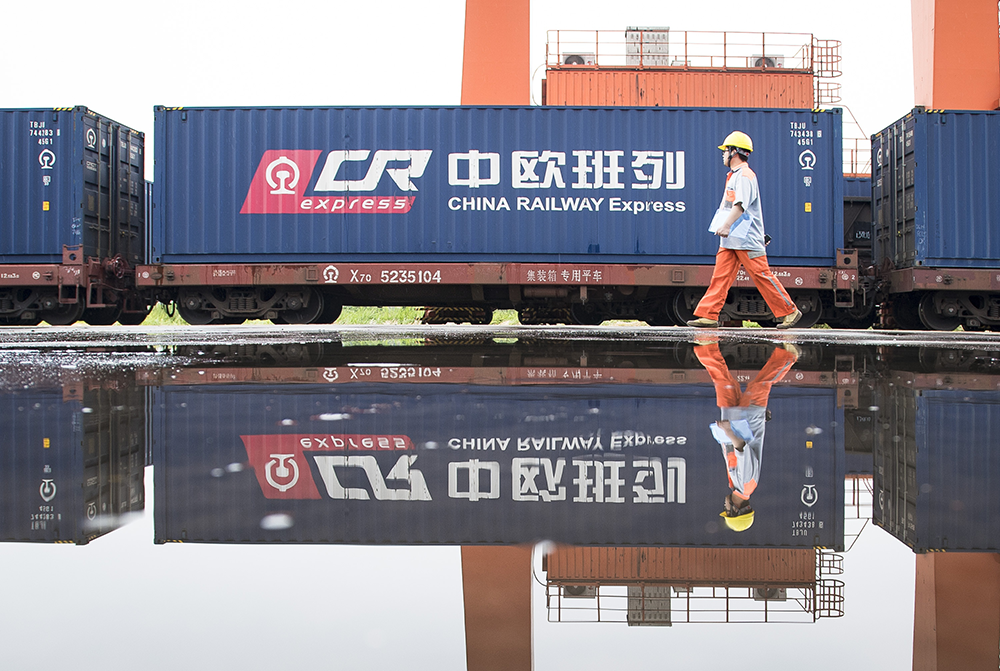 The Trump Administration considers China a strategic competitor to confront, rather than a country with which to engage. The EU, on the contrary, refers to China as a strategic partner and, despite persistent and considerable differences in position in some areas, continues to engage. European Parliamentary Research Service author Gisela Greiger sees the need to seek issue-based alliances and to strengthen strategic cooperation with China in areas of common interest.
The Trump Administration considers China a strategic competitor to confront, rather than a country with which to engage. The EU, on the contrary, refers to China as a strategic partner and, despite persistent and considerable differences in position in some areas, continues to engage. European Parliamentary Research Service author Gisela Greiger sees the need to seek issue-based alliances and to strengthen strategic cooperation with China in areas of common interest.
EU-China ties in a rapidly changing geopolitical context
Since the European Parliament adopted its resolution on EU-China relations in 2015, the geopolitical context has become profoundly less conducive to EU core interests and preferences for multilateral governance and a rules-based international order. The implementation of the Trump Administration’s realist foreign, security and trade policy—which has led the USA to withdraw from several multilateral arrangements that allegedly have not delivered, and to unilaterally impose aluminium and steel import tariffs on ‘national security’ grounds against US allies, seriously impacting EU-US trade ties—has made the USA a less predictable partner for the EU. As a result, China has been able to portray itself as a vibrant advocate of multilateralism and ‘free’ trade, while pursuing a rather gradual and piecemeal ‘reform and opening up’ policy.
Haunted by a trade war with the USA for global economic and technological supremacy, and faced with an emerging united front between the EU, Japan and the USA at the WTO on issues such as forced technology transfers, China allegedly tried to capitalise on strained transatlantic relations by urging the EU to form an anti-US alliance, and to expose US protectionism in a joint declaration ahead of the 20th EU-China Summit in July 2018. This, however, did not happen. The leaders’ joint statement, including their remarks on climate change and clean energy, however, contains strong EU and Chinese commitments to upholding multilateralism and deepening the EU-China strategic partnership. With Sino-US strategic competition growing into a confrontation, the EU may find it difficult to navigate the EU-China-US triangle with ‘middle of the road’ positions, and may be forced to ‘pick a lane’.
US advice to allies to restrict or ban the purchase of IT equipment for 5G networks from the Chinese firms Huawei and ZTE on national security grounds, is a case in point. At the same time, China’s ambitious domestic and foreign policy agenda for a ‘new era’, set out at the 19th Party Congress of the Chinese Communist Party (CCP) in late 2017, presents significant challenges to the EU, including the Belt and Road Initiative (BRI), whose maritime dimension was extended in 2017 to the Arctic in the EU’s neighbourhood, as the ‘Polar Silk Road’. With the BRI, China seeks to build geopolitical influence and shape third markets in line with China’s interests and terms; this reveals a China-centric rather than a multilateral approach to global governance as embraced by the EU.
Principles of EU-China cooperation and human rights
Against the backdrop that China’s authoritarian political system differs significantly from EU liberal democracies, the European Parliament resolution reiterates that—in line with the 2016 EU strategy for China—the EU’s engagement with China should be “principled, practical and pragmatic, staying true to its interests and values”. It also reasserts that the principles of reciprocity, a level playing field and fair competition must be strengthened across all areas of cooperation. It furthermore stresses that EU-China cooperation must be grounded in the rule of law and the universality of human rights.
Enhancing cooperation on global and regional challenges
The European Parliament resolution on the state of EU-China relations states that a broad array of global and regional challenges, including security and peace, non-proliferation, counter-terrorism and climate change, require a genuine EU-China partnership, and that the potential of the EU-China Comprehensive Strategic Partnership should be further exploited and brought to bear in the international arena.
Ahead of the October 2018 Asia-Europe Meeting (ASEM), the EU published its EU-Asia connectivity strategy. The strategy reasserts the principles of future EU cooperation with all Asian partners, such as sustainability and transparency, as well as a level playing field for all actors involved. The EU has not portrayed it as a response to the BRI, but it has been perceived as such by most commentators.

Starting in 2011, freight train trips by China Railway Express to Europe reach 10,000 in total by the end of August 2018.
EU-China trade and investment ties: state of play
Given that the EU ran a deficit of euro (EUR) 176 billion in its trade in goods with China in 2017, which totalled EUR 573 billion, and that EU firms face a significant number of trade and investment barriers in China, such as joint venture obligations, discriminatory technical requirements, including forced data localisation and source code disclosure, the resolution underscores the imbalanced nature and unfulfilled potential of EU-China trade ties. As China’s investment push, driven by its state-led industrial strategy Made in China 2025—curbed in 2017 due to domestic restrictions and host-country scepticism—has targeted EU high-tech firms and strategic energy and transport infrastructure, the resolution raises concerns about state-orchestrated acquisitions that may be contrary to the EU’s strategic interests and undermine its security or public order.
A legislative file, due to be finally adopted in February 2019, addresses related concerns. Since EU firms suffer from discrimination and lack of access to the Chinese public procurement market, which remains largely closed to foreign suppliers, the resolution calls on China to speed up its accession to the WTO Agreement on Government Procurement (GPA), promised in 2001, so as to grant EU firms reciprocal market access. It calls on the EU and China to give new impetus to the slowly progressing negotiations on the comprehensive agreement on investment (CAI) launched in 2013, and on an agreement on geographical indications (GIs) launched in 2010.
EU-China sectoral cooperation: state of play
As an example of deepening sectoral cooperation, the September 2018 European Parliament resolution refers to EU-China cooperation on water policy, which in 2017 saw the creation of the EU-China water policy dialogue. This adds to the China-Europe Water Platform (CEWP), which was established in 2012. Another example mentioned is the recently enhanced EU-China cooperation on China’s nationwide emissions trading system (ETS), launched in 2017. Going forward, there is scope to further deepen cooperation on the reduction of greenhouse gas emissions in areas such as electric mobility, renewable energies and energy efficiency, and the development of instruments for green finance, as well as in respect to the strategic partnership for the implementation of the 2015 Paris Agreement on climate change.
While the European Parliament resolution acknowledges the work of the EU-China Bilateral Coordination Mechanism (BCM) on forest law enforcement and governance (FLEG) to tackle illegal logging globally as another successful area of cooperation, it recommends that China adopt mandatory policy guidelines on responsible overseas forestry investment and investigate significant undocumented trade in timber between FLEGT countries and China.
The resolution also welcomes the 2017 agreement to boost EU-China cooperation on research and innovation with flagship initiatives in areas such as food, agriculture, biotechnologies, environment and sustainable urbanisation, surface transport, safer and greener aviation, and biotechnologies for environment and human health.
Stating that there is room to intensify cooperation on building circular economies and on tackling antimicrobial resistance, and on more sustainable agro-food production and consumption systems, the European Parliament resolution stresses that, since most of the supply of new psychoactive substances to Europe originate in China (according to the European Drug Report 2017), better law enforcement cooperation is required.
Finally, given China’s track record of illegal fishing in foreign waters, the resolution asks China to double down on its law enforcement efforts.
A full, unedited version of this document was prepared for, and addressed to, the Members and staff of the European Parliament as background material to assist them in their parliamentary work. The content of the document is the sole responsibility of its author(s) and any opinions expressed herein should not be taken to represent an official position of the Parliament.


Recent Comments